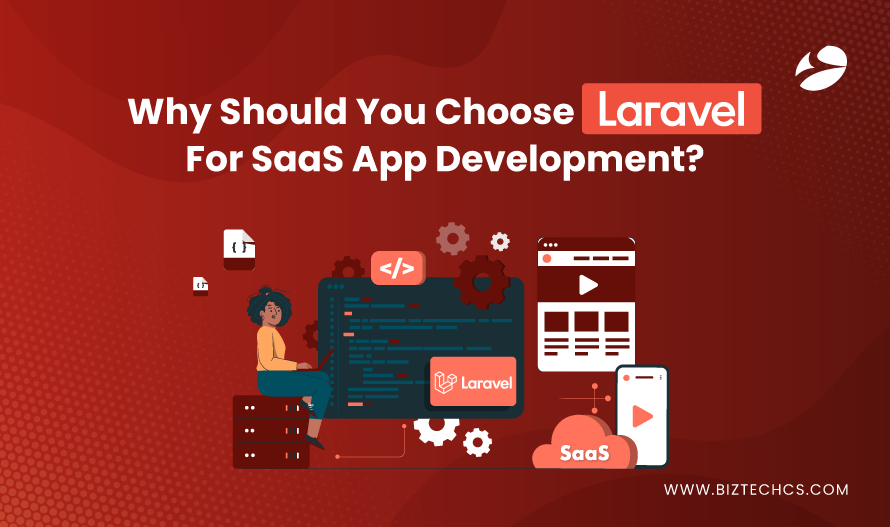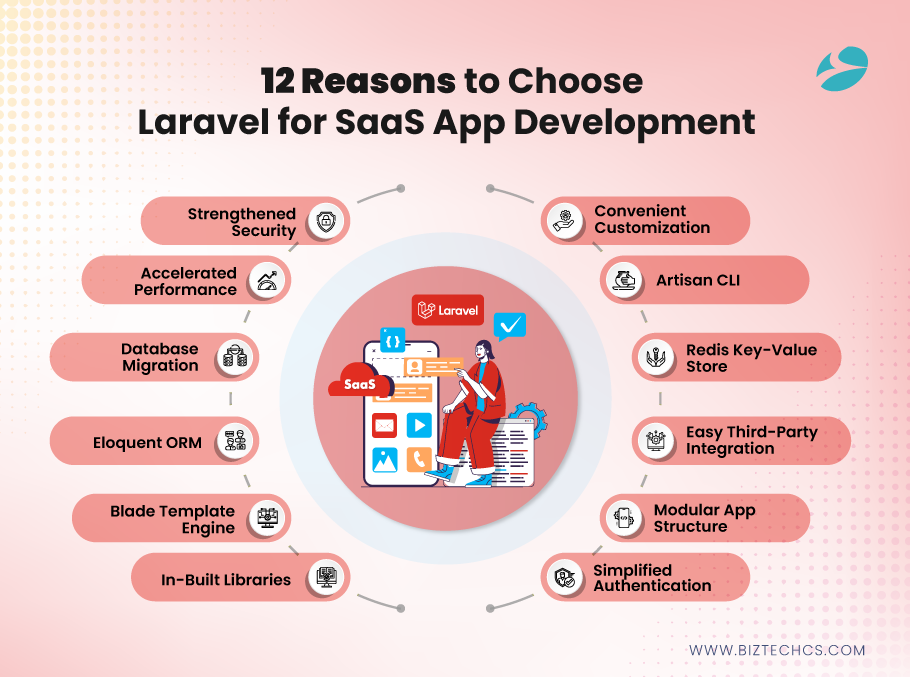4243
Why Choose Laravel for SaaS Development in 2025
04 Jul, 2024
7 min read
4243
04 Jul, 2024
7 min read
Table of Content

Are you planning to build SaaS apps like Invoice Ninja, Zoom, or Slack but don’t know which framework to choose? Building SaaS applications is complex and challenging, so choosing the right framework is crucial for many reasons. However, there are many frameworks out there, in this guide, we’ll explore the top reasons to choose Laravel for SaaS application development.
Laravel is a well-known web app development framework, developed using PHP. It provides many features like validation, routing, and file storage along with built-in features including MVC, and CLI. Backed by these innovative features, the Laravel framework is the right choice to make SaaS development easier and less complex.
From providing pre-built tools to smoothly managing SaaS subscription procedures, Laravel provides many pros that make it the developer’s first choice. So, let’s come to the key discussion point and assess the top 12 reasons to choose Laravel for SaaS before you hire Laravel developers to initiate your project!
Laravel is a popular open-source PHP-based framework used to build high-performance web applications. The framework comes with features including routing, validation, and file storage. Laravel provides built-in features such as CLI (Artisan command-line interface), MVC (model-view-controller) architecture, and native authentication. These state-of-the-art features make Laravel easy to use and increasingly popular amongst developers worldwide.
Enriched with compelling features, Laravel is a trendy web development framework. It has more than 77K stars on GitHub, showing its popularity and usability.
Software as a service (SaaS) is a form of cloud computing in which the service provider permits the user rights to users while taking complete accountability for managing all the resources on their own. It’s a convenient way to deliver apps over the internet that keep users free from installing and maintaining the software. You just need to access and use apps via the internet, keeping yourself free from complex software and hardware maintenance needs.
You may know that SaaS applications are known as Web-based software but are also known as on-demand or hosted software solutions. Software as a service model allows you to use software without worrying about initial heavy investment and time consumption while offering faster solutions at optimal cost.
Laravel undoubtedly has plenty of advantages to offer its users; however, this doesn’t mean it has no limitations. Like other frameworks, Laravel also has some benefits and limitations that you should be aware of before you build SaaS with Laravel. Look at the table below!
Benefits & Limitations of Laravel for SaaS application development.
|
Pros of Laravel for SaaS Development |
Limitations of Laravel for SaaS Development |
| Considerably robust foundation | May not be suitable for large enterprise applications |
| The Laravel ecosystem is enriched with tools and libraries | It has a medium learning curve for newbie developers |
| Robust security and enhanced scalability | You need to have proper knowledge of maintaining best security practices |
| Cost-effective development | Less sufficient for complex codebase creation |

Now that we have explored the basics of Laravel and SaaS and a brief about the pros and cons of Laravel for SaaS, it’s time to dive deeper and explore the reasons why you should build SaaS with Laravel!
Easy customization is one of the significant advantages of building SaaS with Laravel. It simplifies the application architecture and can be an ideal alternative for building large applications. Laravel has features such as a version control system like Git, which lets developers customize the product features with no hassle of code maintenance. The MVC (model-view-controler) model provides separate controllers, models, and views. Using these components, developers can work individually with no stress of distributing app designs and connections.
Apart from that, the Laravel framework provides add-on features like internal caching systems, caching, routes, autoload optimization, minification, JIT compiler, eager loading, and CDN. Developers can use these features to optimize the components with custom code to improve the SaaS application’s efficiency.
Laravel uses Artisan as a CLI (command-line interface). It’s driven by the robust Symfony Console component, which provides commands for web development. Artisan CLI helps Laravel developers migrate data, manage databases, and generate boilerplate code, models, controllers, and the like. It makes Laravel web development much easier by providing code generation and database management features.
Using these features, developers can now focus on creating app logic rather than investing their invaluable time and efforts in writing boilerplate code and setting up the database.
Redis, a key-value store, is often referred to as a data structure server as it supports data types such as hashes, strings, lists, sets, and sorted sets. Laravel supports Redis as a cache for temporary data storage. It’s very helpful as caching data to Redis accelerates database queries and feedback, making data retrieval fast. As a result, it makes your web application perform faster.
When you build a Laravel SaaS application, you need third-party integration like cloud integration, payment gateways, and image processing. Integrating payment gateways, email services, and social media APIs adds robust and high-performance features to web applications. Laravel provides efficient ways for integration with third-party tools and services, which is crucial, specifically for those seeking to leverage multiple external services in their app.
Besides, Laravel provides simple yet efficient API management to eliminate complexities in web development associated with API connections and management. It makes this framework an excellent choice for SaaS application development
Laravel is an MVC (model-view-controller) framework that simplifies various processes like updating, extending, and maintaining certain parts of an app. SaaS applications are required to scale in terms of functionality and user base. With a modular architecture in the Laravel SaaS framework, developers can add new features or modules with no disruption to the entire application. Developers can develop, test, and deploy each module separately.
It helps you create modules that you can integrate into your web app later as needed. You can also add or remove third-party tools to the web application. Besides, Laravel enables you to eliminate API management issues.
Laravel provides an access control system that simplifies the authentication implementation to limit access to different assets and resources. Laravel Authentication encompasses a complete suite of functionalities, allowing easy authentication implementation for login, registration, and login reset features. By making use of Laravel’s built-in capabilities, developers can set up essential authentication features with ease and convenience.
Providing built-in libraries is one of the significant reasons why you should choose Laravel for SaaS development. Laravel provides a suite of unique libraries such as Laravel Excel, Laravel Passport, Laravel debugbar, Laravel Yajra Datatable, and Laravel Socialite. These built-in and object-oriented libraries make Laravel an excellent choice for developers who want to build enterprise-level SaaS applications.
Laravel provides a Blade Template Engine that you can use for different purposes like connecting to the data model, processing app code inside the template tags, or diverting output to text files or other streams. The Blade templating engine feature makes Laravel SaaS app development streamlined and easy.
Laravel is an excellent framework for SaaS development for many reasons, however, Eloquent ORM (object-relational mapper) is one of the crucial ones. Eloquent ORM is a database management tool embedded with the Laravel framework that makes it convenient to interact with the database. Eloquent ensures every database table has a corresponding model that you can use to interact with the table. The Eloquent model retrieves records from the table, enabling integrating deleting, and updating records.
Laravel provides database migration features that enable the Laravel web development team to create an entirely fresh database. Using these database migration features, you’ll be more competent in updating your existing version to the latest and upgraded version with no hassle. The easy database migration ensured by database migration features makes Laravel the right choice for SaaS app development.
Accelerated performance is one of the key reasons why you should choose Laravel for SaaS development. Route caching in Laravel is a significant performance optimization feature for apps with various roots and settings. Streamlining the route registration procedures improves the overall app’s performance to a significant extent, making the Laravel SaaS framework an excellent choice for SaaS app development.
Security is one of the most crucial concerns when building SaaS apps. Laravel provides robust security features like secure routing, HTTP authentication, password hashing, and AES (Advanced Encryption Standard) encryption. These measures ensure the next level of security of SaaS apps built using Lavavel.
Now that we’ve become aware of the reasons for choosing Laravel for SaaS, it’s time to check the real-life examples of web apps built using Laravel. Looking at real-life examples is more likely to give you a clear picture of what your SaaS app would look like. Following are some of the applications developed with Laravel:
That’s all there’s to it! There are many reasons why you should choose Laravel for SaaS application development. Laravel for SaaS can be an excellent option for businesses willing to build an app with features like robust scheduling, queues, caching, testing, etc. Furthermore, its easy third-party integration, database migration features, and robust security are some of the significant pros for why to opt for Laravel for SaaS app development.
You can develop a high-performance SaaS application, however, doing so will require you to have appropriate resources like experienced Laravel developers, a well-developed infrastructure, etc.
At BiztechCS, we’re a Laravel development company providing comprehensive services to businesses from across the globe. Backed by years of experience and expertise in Laravel, we can be the right choice to assist you with your Laravel SaaS app development initiative! Contact us to discuss your project!
Laravel is an excellent choice for SaaS development. It is pre-equipped with components to build modules such as admin, subscription, and payments dashboards. The framework provides features like validation, routing, file storage, and built-in features like CLI and MVC. Backed by these high-performance features, Laravel streamlines operations for SaaS apps and is the right choice for SaaS application development.
Scalability is one of the reasons why businesses choose Laravel for SaaS development. Laravel apps are developed using a modular approach. The codebase is built on small and independent components like models, controllers, and services. In short, SaaS apps built using Laravel have reusable components, are easy to maintain, and are horizontally scalable.
Laravel is designed specifically to be fast and scalable. Laravel provides built-in tools to manage SaaS subscription procedures conveniently. Besides, Laravel is scalable and can be developed timelessly. This makes it a great choice for startups looking to build SaaS apps. It helps them grow and quickly scale their apps.
The deployment best practices for Laravel SaaS applications are environment configuration, version control & branching, dependency management, database migration & seeding, secure configuration, and constant integration & deployment.

Artificial Intelligence (AI)
102
By Uttam Jain
10 Dec, 2025

Artificial Intelligence (AI)
192
By Afzal Qureshi
09 Dec, 2025

Artificial Intelligence (AI)
176
By Afzal Qureshi
09 Dec, 2025